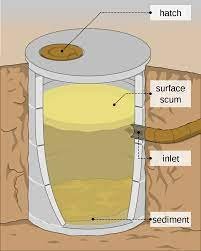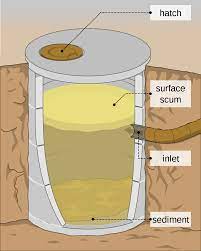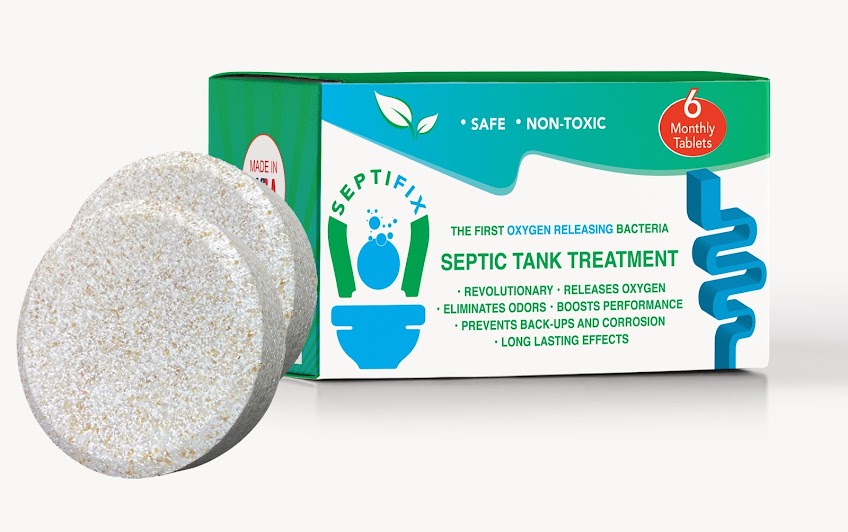TheLowdown on Cesspools: What You Need to Know
A cesspool is an underground container or pit that collects and stores untreated liquid waste until it can be emptied and disposed of elsewhere. Unlike septic tanks, which filter liquid waste back into the ground, cesspools do not treat the waste they collect. The soil surrounding a cesspool may have difficulty purifying the waste due to its high concentration, leading to unpleasant odors and potential blockages if left unchecked.
Cesspools often get a bad reputation, but what exactly are they and why do houses have them? In this blog post, we will dive into the world of cesspools and explore their function, types, and differences from septic tanks. We’ll also look at why homes may have cesspools installed and the importance of maintaining them through regular cleaning and inspection. Additionally, we’ll cover the EPA regulations surrounding cesspools in the United States, including banned types. Finally, we’ll wrap up by discussing the pros and cons of using a cesspool as a cost-effective solution for sewage disposal. Whether you already have a cesspool or are considering installing one, this article will provide all the information you need to make an informed decision.
Do You Need Septic Tank Pumping/Cleaning, Installation, & Repair Services Call 1.855.925.0760 Or Request a Service Quote

Understanding Cesspools
Maintaining an efficient sewage system is vital to keep your home clean and hygienic. Cesspools are underground tanks that serve as a temporary solution for storing sewage waste. Regular maintenance and cleaning of these cesspools are mandatory, as failing to do so can lead to overflow and contamination. Cesspools pose health risks if not properly maintained or located near water sources. In certain cases, local regulations and requirements may necessitate the replacement of cesspools with modern septic systems. Understanding the basics of cesspools is crucial to ensure a hygienic living environment for you and your family.
Definition and Function
Cesspools are a type of underground wastewater treatment system that collects and stores sewage waste. They operate on a basic principle: solids settle at the bottom while liquids are released into the surrounding soil. These systems are commonly used in areas without access to a municipal sewer system, but they require regular maintenance such as pumping and cleaning to prevent overflow and contamination of groundwater. With increasing concerns about their negative impact on the environment, cesspools are becoming less common these days. Proper maintenance is crucial to avoid any potential health hazards associated with these systems.
Differences Between Cesspools and Septic Tanks
When it comes to wastewater management, cesspools and septic tanks are two commonly used systems. While both perform similar functions, there are significant differences between them. Cesspools are underground storage tanks that collect and store wastewater, while septic tanks treat and dispose of wastewater. Unlike cesspools, septic tanks use a combination of bacteria and treatment systems to break down waste before releasing it into the surrounding soil. Septic tanks also have larger capacity than cesspools, which means they require less frequent pumping and maintenance. Therefore, understanding these differences is crucial for choosing an appropriate system for your property.
Types of Cesspools
When it comes to cesspools, there are two main types: lined and unlined. Lined cesspools have a concrete or plastic lining that prevents waste from seeping into the surrounding soil. Unlined cesspools, on the other hand, do not have a lining and rely on the natural filtration of the surrounding soil to treat waste. Both types require regular maintenance and pumping to prevent backups and contamination. It’s important to understand the differences between these two types of cesspools in order to choose the right one for your property and ensure proper maintenance. Additionally, it is crucial to stay up-to-date with regulations and guidelines for cesspool use in your area to avoid any potential legal issues.
Do You Need Septic Tank Pumping/Cleaning, Installation, & Repair Services Call 1.855.925.0760 Or Request a Service Quote
Why Houses Have Cesspools
Houses in areas without access to municipal sewer systems often rely on cesspools as a cost-effective solution. Cesspools are typically installed in rural or remote areas, where it may be impractical or costly to connect to a centralized sewer system. Additionally, some homes with older plumbing systems still use cesspools as their primary method of wastewater disposal. While they may not be the most modern or sophisticated option, cesspools remain a popular choice for many homeowners due to their affordability and reliability. However, it’s important to note that maintaining and repairing a cesspool can be both time-consuming and expensive, so it’s essential to make informed choices when deciding on the right sewage system for your property.
Lack of Access to Municipal Sewage Systems
In areas where there is no access to municipal sewage systems, cesspools offer a viable alternative for handling wastewater. This is often due to the location of the property or the high cost of connecting to a municipal system. Cesspools function by allowing wastewater to seep through the walls and bottom of the pit, where it is filtered by soil and microorganisms. However, this method can become problematic if cesspools are not maintained properly, leading to issues such as backups and groundwater contamination. Homeowners with cesspools should have them inspected regularly and pumped out as needed to ensure they continue functioning correctly.
Cost-Effective Solution
When it comes to wastewater disposal, cesspools can be a cost-effective solution for homeowners. In areas without access to municipal sewer systems, cesspools are often the go-to option due to their affordability and easy installation. Cesspools can also be used in areas with high water tables or poor soil conditions where traditional septic systems may not work effectively. However, it’s important to note that while cesspools may save homeowners money upfront, they require more frequent maintenance than other systems. Furthermore, if not properly maintained, they may pose environmental and health risks.
Maintaining a Cesspool
Maintaining a cesspool is essential to prevent backups, overflows, and groundwater contamination. Regular pumping and cleaning are necessary to keep the system functioning properly. Homeowners should avoid flushing non-biodegradable materials or chemicals down the drain as these can cause damage to the cesspool. Heavy vehicles and equipment should also be kept off the area around the cesspool to prevent damage. Additionally, regular inspections can help identify issues early on and prevent costly repairs. It’s important for homeowners with cesspools to take proactive steps to maintain their systems and avoid potential problems.
Regular Emptying and Cleaning
Maintaining a cesspool requires regular emptying and cleaning to prevent issues like backups and odors. The frequency of cleaning depends on factors like the size of the tank and the number of people using it. It’s crucial to have a professional cesspool cleaner remove solid waste and sludge from the tank since they can cause damage or leaks if left unchecked. Proper disposal of waste removed from the cesspool is also essential to avoid environmental contamination. Regular maintenance not only extends the lifespan of your cesspool but also saves you from costly repairs down the line.
Signs of Cesspool Problems
Regular maintenance of your cesspool is key to preventing issues and avoiding costly repairs. Signs that your cesspool may be experiencing problems include slow drains, foul odors, and standing water in your yard. If you notice any of these signs, it is essential to have your cesspool inspected by a professional as soon as possible. Regular pumping can also help prevent problems and extend the life of your cesspool. Remember to dispose of household waste and chemicals properly to avoid damage to your cesspool. By following these tips, you can ensure that your cesspool stays functioning properly for years to come.
Importance of Professional Inspection
Regular inspection by a professional is essential to maintaining the health and safety of your cesspool. A cesspool that is not properly maintained can lead to backups, leaks, and other costly issues. Professional inspectors can identify potential problems early on and prevent them from becoming larger, more expensive repairs. The frequency of inspections may vary depending on factors such as the size of the system, usage, and local regulations. By investing in professional inspections and following their recommendations for proper maintenance techniques like pumping and cleaning, you can ensure that your cesspool operates efficiently and safely for years to come.
Cesspool Regulations
As cesspools become a less popular option for wastewater management due to environmental concerns, it’s essential to understand and comply with local regulations. Regulations may vary by state or jurisdiction, and some areas have prohibited their use altogether. Compliance may involve regular inspection or maintenance of cesspools. Failure to adhere to local regulations could result in fines or penalties. Therefore, it’s crucial to explore alternative options like septic systems or connecting to municipal sewage systems where available. Understanding and complying with local regulations can help ensure that cesspool usage remains safe and sustainable.
EPA Regulations in the United States
The Environmental Protection Agency (EPA) plays a crucial role in regulating the use of cesspools in the United States. Due to their potential to contaminate groundwater and surface water, certain areas have banned the use of cesspools altogether. New construction projects are required to use alternative wastewater treatment systems instead of cesspools. Existing cesspools may be required to upgrade or replace their system if they are found to be leaking or causing contamination. Homeowners should contact their local health department or EPA office for information on regulations specific to their area. It’s essential to understand and comply with local regulations, as non-compliance could lead to fines or penalties.
Banned Types of Cesspools
Certain types of cesspools have been banned in the United States due to their potential harm to the environment and public health. Large capacity cesspools, with a volume of more than 1,000 gallons, are among the types that have been banned by the Environmental Protection Agency (EPA). These cesspools can contaminate groundwater sources and cause harm to nearby bodies of water. Homeowners who own banned types of cesspools may be required to upgrade to a more environmentally-friendly system. It is important to check local regulations before installing or maintaining a cesspool on your property. Regular maintenance and pumping of a properly functioning cesspool can help prevent environmental damage and ensure compliance with local regulations.
Pros and Cons of Cesspools
When it comes to cesspools, there are both pros and cons to consider. On the positive side, cesspools are generally more cost-effective than other septic systems, making them an attractive option for homeowners on a budget. Additionally, they require minimal maintenance and can be suitable for areas with poor soil quality. However, there are also significant drawbacks to using a cesspool. If not maintained properly, they can contaminate groundwater sources and emit unpleasant odors. Furthermore, frequent pumping may be necessary to keep the system functioning correctly. It’s essential to weigh these pros and cons carefully when considering whether a cesspool is the right choice for your property.
Advantages of Cesspools
Cesspools offer several advantages over other wastewater treatment systems. They are more affordable than traditional septic systems and require less maintenance. Since they don’t need to be pumped as often, they can be a practical solution for smaller properties or those with limited space. In some areas, cesspools may be the only option due to local regulations or soil conditions. However, it’s important to keep in mind that cesspools can contaminate groundwater if not maintained properly and may emit unpleasant odors. Nonetheless, advancements in technology have led to the development of more efficient and eco-friendly alternatives to cesspools.
Disadvantages of Cesspools
Cesspools are not without their drawbacks. One disadvantage is that they require more maintenance than traditional septic systems and may need to be pumped more frequently. This can result in additional costs and inconvenience for homeowners. Another potential issue is the health hazard that can arise if a cesspool is not properly maintained. Given that cesspools can contaminate groundwater, it’s crucial to take proactive steps to ensure that they are functioning correctly and do not pose a risk to public health. Additionally, some areas prohibit the use of cesspools due to their environmental impact, which means homeowners must explore alternative options. Regardless of the drawbacks, however, cesspools can still be a viable option depending on individual circumstances, such as household size, property type, and local regulations.
Closing Thoughts
As we’ve explored in this post, cesspools can be a viable solution for waste management in certain areas and situations. However, it’s important to consider the potential risks and drawbacks before deciding if it’s the right option for your property. Cesspools require regular maintenance to prevent contamination of groundwater and nearby bodies of water, which can have serious environmental and health consequences. Upgrading to a modern septic system may be a more sustainable and cost-effective option in the long run. Ultimately, whether you’re living in an area without municipal sewage systems or looking for an alternative to traditional septic tanks, it’s essential to weigh the pros and cons of all available options before making a decision that impacts both your wallet and the environment.
Do You Need Septic Tank Pumping/Cleaning, Installation, & Repair Services Call 1.855.925.0760 Or Request a Service Quote
Frequently Asked Questions
What is the purpose of a cesspool?
The purpose of a cesspool is to collect and hold human waste and other sewage materials until they can be properly disposed of. Typically found in areas without access to a public sewer system, a cesspool is an underground tank used for the disposal of sewage waste.
It is important to ensure proper maintenance and regular pumping of the cesspool to prevent overflow and environmental hazards.
What is the purpose of a cesspool?
The purpose of a cesspool is to collect and store sewage and wastewater in an underground tank until it can be pumped out and transported for treatment. Cesspools are commonly used in areas without access to a municipal sewer system. However, they require regular maintenance and may pose environmental and health risks if not properly cared for. It’s important to ensure that your cesspool is regularly inspected, pumped, and maintained by a licensed professional to prevent any potential problems.
Conclusion
Cesspools are an effective solution for those looking to avoid the expensive installation and maintenance costs of a traditional septic tank. However, they require regular care and attention to ensure that they function correctly and avoid any health hazards. It’s essential to have your cesspool regularly inspected by a professional and emptied as needed. While there are some disadvantages to using cesspools, many homeowners find them to be a cost-effective and reliable alternative to traditional sewage systems. Regardless of whether you choose a cesspool or another type of sewage system, it’s vital to understand the regulations in your area and follow best practices for safe and hygienic waste disposal. For more information on how to maintain your cesspool and keep it functioning effectively, check out our detailed guide on everything you need to know about cesspools.











